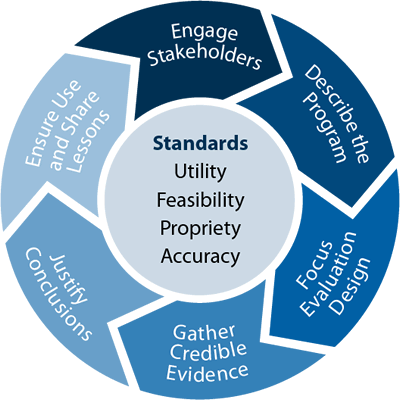A Framework for Program Evaluation
Effective program evaluation is a systematic way to improve and account for public health actions by involving procedures that are useful, feasible, ethical, and accurate. The Framework for Evaluation in Public Health guides public health professionals in their use of program evaluation. It is a practical, nonprescriptive tool, designed to summarize and organize essential elements of program evaluation.
Adhering to the steps and standards of this framework will allow an understanding of each program’s context and will improve how program evaluations are conceived and conducted. Furthermore, the framework encourages an approach to evaluation that is integrated with routine program operations.
The emphasis is on practical, ongoing evaluation strategies that involve all program stakeholders, not just evaluation experts.
Understanding and applying the elements of this framework can be a driving force for planning effective public health strategies, improving existing programs, and demonstrating the results of resource investments.

Centers for Disease Control and Prevention. Framework for program evaluation in public health. MMWR 1999;48 (No. RR-11)
- summarize the essential elements of program evaluation,
- provide a framework for conducting effective program evaluations,
- clarify steps in program evaluation,
- review standards for effective program evaluation, and
- address misconceptions regarding the purposes and methods of program evaluation.
- Framework for Program Evaluation in Public Health – MMWR 1999;48(No. RR-11)
- Overview of the Framework – Provides 3-page key points from framework
- Framework Summary – Provides summary of the framework with details
- CDC Evaluation Framework – YouTube video describing the evaluation framework
E-mail: cdceval@cdc.gov